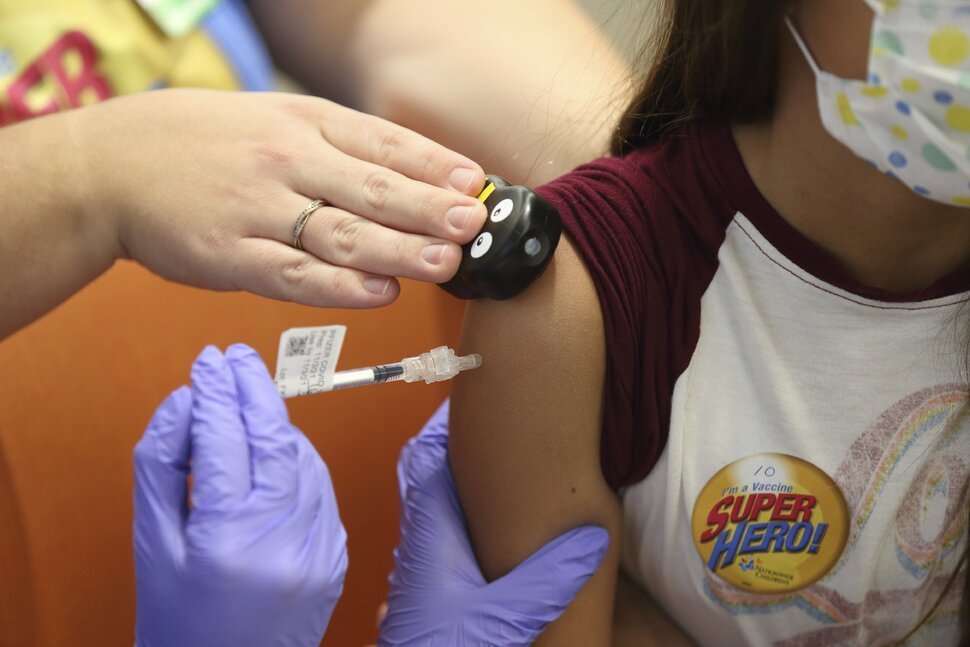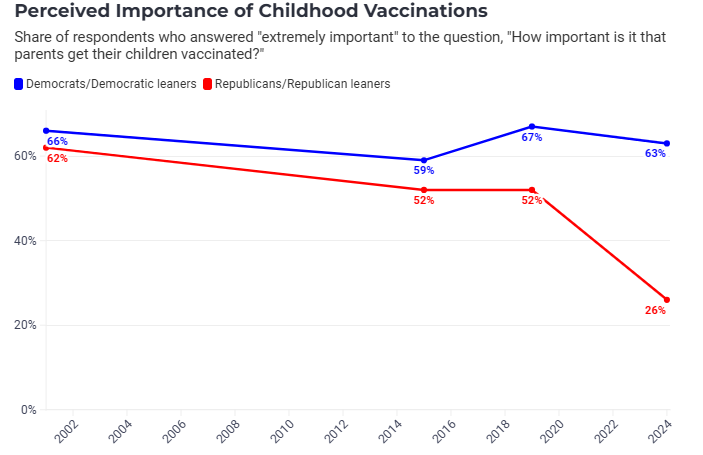New data points to a precipitous decline in the share of Americans who see childhood vaccines as extremely important, as well as a pandemic-driven partisan divide.
If this Gallup poll were a presidential campaign ad, it might end with, “My name is Measles Hepatitis, and I approve this message.”
The venerable public opinion firm’s latest look at attitudes toward child vaccinations shows fewer Americans than ever consider them important – another sign of how the blend of pandemic and politics changed the country.
- 40% say the shots are extremely important, down from 58% in 2019 and 64% in 2001.
- Taken together, the proportion of Americans who say childhood vaccines are either “extremely” or “very” important amounts to 69%, down from 94% in 2001.
At the other end of the spectrum, 17% of Americans say immunizations for kids are somewhat important, 5% say not very important and 7% say “not at all” important. That’s not a big number, but the not-at-all camp comprised just 1% of people back in 2001.
Republicans and Their Allies Drove This Decline
This is obviously a public health story. Government has an interest in preventing the spread of potentially fatal diseases – and arguably a duty to do so – while considering trade-offs like the impacts on the economy and personal freedom. Mass immunizations have kept in check outbreaks of diseases like polio and measles that used to be far more common.
But it’s also a political story, since widespread Republican skepticism about the COVID-19 vaccine and government officials’ pandemic response – fueled in part by disinformation and conspiracy theories – appears to be tied to the drop in overall support for childhood immunizations.
Two decades ago, there was barely a difference between the two parties. Sixty-six percent of Democrats and Democratic-leaning independents and 62% of Republicans and Republican leaners said then that it was extremely important to get children vaccinated.
- Today, the “extremely” number for the GOP and GOP-leaners is just 26%. It was 52% in 2019, before the pandemic.
- 11% of Republicans and Republican leaners say it is not important at all for parents to get their children vaccinated.
- While 93% of Democrats and Democratic learners say it is extremely or very important to get children vaccinated, just 52% of Republicans and Republican leaners say the same.
About Government Mandates
Similarly – and perhaps inevitably – opposition to vaccine mandates has strengthened since the pandemic.
- In 2019, Gallup found 62% support for the proposition that the government should require immunizations against such illnesses as measles. (Gallup said a Princeton Survey Research Associates poll in 1991 found 81% support for this idea.)
- In Gallup’s latest survey fielded last month, that number was down to 51%.
- And 45% of Americans now say the government should stay out of that issue – up from 35% in 2019.
Here, too, it’s Republicans and Republican-leaners driving the trend: 36% of them say the government should require vaccines, down from 53% in 2019, and fully 60% now oppose government vaccine mandates.
On the other side of the aisle, attitudes have barely budged: 69% support mandates, down from 72% in 2019.
Practical Implications
In late 2023, my colleague Cecelia Smith-Schoenwalder highlighted a report from the Centers for Disease Control and Prevention detailing how vaccine exemptions for kindergarteners in 2022-2023 reached the highest level ever reported in the U.S.
Most of the exemptions, Cecelia noted, “were listed as nonmedical.”
Last week, my colleague Steven Ross Johnson reported that measles outbreaks from January to July of this year were already more than triple the number seen in all of 2023. This year so far? 203 cases were reported across 25 states, plus D.C. and New York City, according to the latest data from the CDC. In 2023? Fifty-nine cases for the whole year.
- Almost all of the cases this year – 95% – have afflicted people who were either unvaccinated, whose vaccination status was unknown, or who had received only one dose of the measles, mumps, and rubella vaccine, which is 93% effective against measles after one dose and 97% effective after two doses.
(Side note: While not a complete proxy for childhood vaccinations, you can use this Healthiest Communities data explorer to examine the relationship between county-level adult flu vaccinations and mortality tied to COVID, influenza and pneumonia. You can even layer in the share of voters who went for Biden in 2020.)
Putting all of this in stark relief, a new report from the CDC on Thursday says among some 117 million kids born from 1994 to 2023, “routine childhood vaccinations will have prevented approximately 508 million lifetime cases of illness, 32 million hospitalizations, and 1,129,000 deaths, at a net savings of $540 billion in direct costs and $2.7 trillion in societal costs.”
Politics and Pandemics
Some Americans have medical conditions that mean they cannot get vaccinated – against COVID or other ailments. For them, having others around them immunized can offer a measure of safety. This also plays into the concept of herd immunity.
But many Americans have simply decided vaccine mandates are intolerable.
And some politicians are done with pushing their constituents to get the shots.
Back in late 2021, I took note of remarks from Gov. Jared Polis, Colorado’s Democratic chief executive, who declared out of frustration that he was done pushing vaccines.
“At this point, if you haven’t been vaccinated, it’s your darn fault,” Polis told Colorado Public Radio’s Ryan Warner, host of Colorado Matters. And “those who get sick, it’s almost entirely their darn fault.”
Polis likened the vaccine to cold-weather gear.
“You don’t tell people what to wear. You don’t tell people to wear a jacket when they go out in winter and force them to [wear it],” he said. “If they get frostbite, it’s their darn fault.”
Related posts:
- Todays Headlines Dengue reaches historic levels in the Americas and closer to home
- Is COVID still worth worrying about? It depends on your situation. Are you planning a family wedding or vacation? If you’re over 65 or immunocompromised, you’re at higher risk.
- Six in 10 U.S. Adults Say They Walk for Leisure, Exercise
- Meet the ‘Little City’ in Virginia That’s America’s Healthiest Community











Leave a Reply